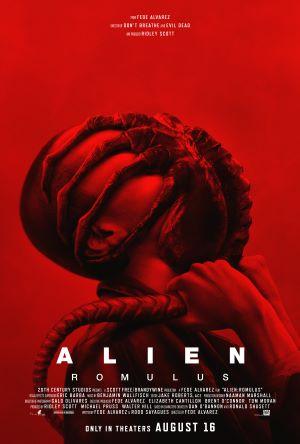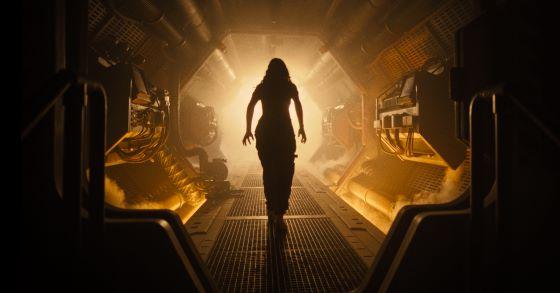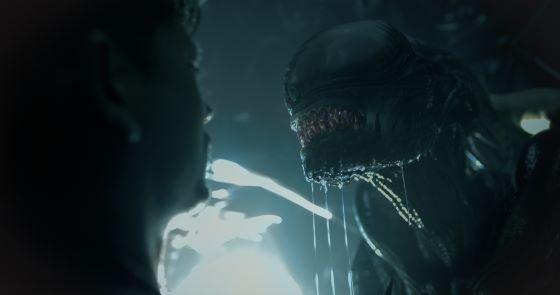

[Rating: Solid Rock Fist Up]
In Theaters Friday, August 16
So, it turns out that in space there’s plenty of people around to hear you scream, and these cries aren’t limited to chest-bursting events. Alien: Romulus supposes that an off-planet human race with colonial marines, years-long work contracts, and glitchy androids is bleak enough to entice scrappy 20-somethings into suicide missions in zero-g, where things are dangerous enough without murderous parasitic space spiders. This social aspect of the broader Alien universe underpins much of the narrative for the new chapter in the xenomorph saga, which is stronger for it and thrilling/fun to boot.
Although the creatures are the face of this franchise, it has always been the “Company,” Weyland-Yutani, that drives these stories forward in one way or another. Romulus is no different, as it takes place off-Earth on Jackson’s Star colony, a sun-starved mining and agricultural concern staffed by humans that are little better than indentured servants. Rain (Cailee Spaeny) and her android brother, Andy (David Jonsson), toil away on Jackson’s Star in the hopes of one day booking transport off-planet, yet the Company has recently extended everyone’s term of service, putting their shared dream seemingly out of reach.
This leads the pair to Rain’s ex-boyfriend, Tyler (Archie Renaux), whose sister, cousin, and cousin’s girlfriend are planning a salvage raid on an abandoned Weyland-Yutani vessel in orbit just above them. Their target is rumored to have cryo-pods that would allow the group to book long-distance travel away from their shit lives, which is enough to get Rain and Andy on-board and into what turns out to be a derelict space station, part of which is named “Romulus.” No spoilers, but this IS an Alien franchise entry, so one can guess the general trajectory of the second act, which includes all the screaming, running, and face-hugging fans of these movies could hope for.

Director Fede Alvarez, who co-wrote the Romulus script with frequent collaborator Rodo Sayagues, blends prescient sociopolitical ideas rooted in corporate greed and worker exploitation with the classic body-horror elements of the franchise with seamless and earnest ease. The themes are potent ones in 2024 and give considerable texture to the now-mythic greed of Weyland-Yutani. The company’s view of humans as secondary considerations in their pursuit of profit and knowledge is the backbone of the franchise writ large, and the movie’s use of its setting and characters all benefit from this thematic buttress.
Weyland-Yutani created conditions on Jackon’s Star that make Rain and co. desperate enough to bet on the salvage mission longshot, which itself turns into a veritable abattoir due in no small part to the company’s insatiable pursuit of intel on outer space’s most cranky inhabitant. And while there’s callbacks aplenty to pretty much every iteration of this universe (including a video game installment), Romulus is anchored in this larger struggle of humanity in a future where people are reduced to little more than working livestock.
Indeed, in this world, the aliens are a mere nuisance compared to the outright villainy of Weyland-Yutani, and the insinuation of this menace starts with the costumes and set design. Both paint the world presented in Romulus as exhausted, derelict, and devoid of any inviting aesthetics; the space station is fresh and stocked with clean retro tech while everything on Jackson’s Star, including the people, look like they haven’t had a rinse or refurb in decades.

And as for those people, Rain and her cohort carry themselves like the volatile, hungry wretches that one would expect from this world, injecting the story with a palpable desperation that drives the plot forward. And while Spaeny, Jonsson, Renaux, and the others don’t necessarily need this extra narrative flourish to make the action meaningful (the thoughtful blocking and crisp effects accomplish this), it affords the audience the opportunity to buy into these characters, their problems, and the world that houses them. Spaeny and Jonsson in particular sell this desperation from the jump, and their believable connection as siblings with a history of codependence are a big reason the story works as well as it does.
And besides all of that, Romulus is just plain, good old-fashioned fun once the creepy-crawlies take the stage. The use of practical creatures in many of the action scenes add a tangible, visceral element that has been missing from the franchise in recent years, and brings the xenomorphs and related action back to its Rambaldi/Winston roots. Shot framing, dialogue, and costumes harken back to other installments throughout, yet this is more than just a cover collection of the universe’s most famous designs and set pieces. While they have their fun with that stuff (especially one particular callback), Alvarez and Sayagues have crafted their own story, here, and even saved a few new tricks for the finale, which (for good or bad) is guaranteed to rattle some people.
At 119 minutes, Alien: Romulus moves well, keeps the audience guessing, and is stocked with actors good enough to sell their parts, yet unfamiliar enough to keep the audience guessing about which might become the next xenomorph entrée. Stunning visuals and deliberately jarring/effective sound design work put the audience right in the middle of this world, which eerily bears a passing resemblance to our own at times (minus the parasitic space spiders). The finale is sure to be divisive, along with some of the nostalgia-baiting, but for fans that have lamented a lack of gore, horror, and weirdness in this franchise, they need worry no longer.





Comments on this entry are closed.